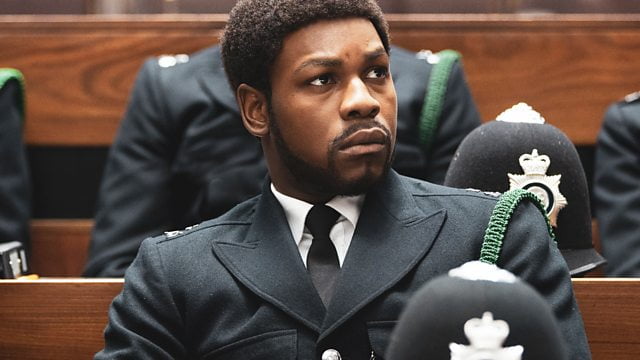Steve McQueen’s ‘Red, White and Blue’ shows us that representation isn’t so simple
December 15, 2020

Source: BBC
The word representation is used frequently in our everyday lives. There’s mounting pressure for greater representation of people from minority ethnic backgrounds in politics, in the media, and in our institutions. However, whilst greater representation is important, whether it can lead to structural change is up for debate. This issue is explored eloquently in Steve McQueen and Courttia Newland’s film ‘Red, White and Blue’.
‘Red, White and Blue’ is the third film in the Small Axe miniseries on BBC One. It follows the life of police officer Leroy Logan (played by John Boyega) in the early eighties. The son of Jamaican immigrants, Logan quits his job as a scientist to join the Metropolitan Police in 1983 in an effort to improve the relationship between the police and the West Indian community in North London. This decision comes after his father Ken (played by Steve Toussaint) is brutally attacked by two officers who accuse him of parking illegally. Seeing as all officers in his area are white, Leroy believes that he can be the “bridge” between the police and the black community.
Inadvertently, Logan’s relationship with his family and friends deteriorates following his decision to work for “the beast”. A moving moment between father and son occurs when Leroy’s dad drops him off for his first training session as Al Green’s ‘How Can You Mend a Broken Heart’ plays in the background. In the process of trying to bring about change for his community, Leroy and the most important man in his life grow apart. As well as reflecting the story of real life Leroy Logan, this storyline reflects the pressure felt by a lot of second generation immigrants in the UK; we don’t want to let our parents down and sometimes it’s difficult for them to see things from our perspective.
At the same time, Leroy becomes isolated from the young black men in his area, who nickname him “Judas” and “coconut”. The term coconut stands out as it leaves the audience questioning what it means to be black in the first place: is it possible for people from minority backgrounds to get involved in predominantly white institutions without sacrificing a part of their identity? Or, alternatively, are McQueen and Newland poking fun at those who possess such narrow conceptions of what it means to be black?
The film links to the reform vs abolition, and good cop vs bad cop debates that were prevalent during the Black Lives Matter protests over the summer. Leroy joined the force in order to reform it from within, but he ends up having to standby as white officers use brute force against black people in front of him. Consequently, Leroy bonds with an officer of Pakistani heritage named Asif Kamali (played by Assad Zaman), as neither are able to convince the other officers to respect their contribution to the force.
As the racist abuse that Leroy and Asif are subject to gets increasingly worse, Asif walks away from the force altogether. However, when Leroy considers leaving, his wife Gretl (played by Antonia Thomas) persuades him to stay. She argues that walking away would mean “dropping out for those racists”, which encourages Leroy to go back to his original principle of reforming from within. Since the film ends in the early eighties, we don’t get to see whether Logan sticking around for longer was worth it.
However, we can see today that despite the Met’s commitments to increasing diversity, structural racism is still an enormous problem in policing. The real life Leroy Logan stated in a recent interview that relations between black people and the police are at the “worst they’ve been for decades”. Therefore, the message of ‘Red, White and Blue’ seems to be that whilst representation should facilitate structural change, this isn’t guaranteed unless people with power choose to listen to the minorities concerned. In other words, having black faces isn’t enough, black voices also need to be listened to.
You can watch all of the films in the ‘Small Axe’ miniseries on BBC iPlayer.
Filed under: Film, TV & Tech
Tagged with: family, force, john boyega, police, police brutality, race, Racism, red white and blue, representation, small axe, steve mcqueen, structural



Comments